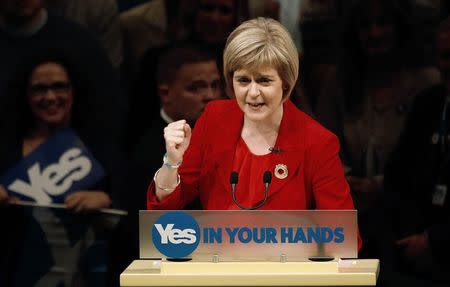Independence still a goal, nationalist Sturgeon aims for top Scotland job

By Alistair Smout GLASGOW Scotland (Reuters) - Scottish separatist Nicola Sturgeon said on Wednesday she would run for the leadership of the Scottish National Party (SNP), with independence from the rest of the United Kingdom still her long-term goal despite last week's failed referendum. If she succeeds, Sturgeon would almost certainly become first minister of Scotland. She is the clear favourite as other major nationalist politicians have ruled themselves out. She told reporters her focus for now would be to hold London politicians to their promise of more powers for Scotland while building what she said was a fairer society. Sturgeon, who would replace outgoing First Minister Alex Salmond as SNP chief, said she was not planning another referendum but that the question of independence could be reopened should the Westminster parties renege on their promise of further powers, or threaten to leave the European Union. After failing to secure the Scottish people's backing for independence in the vote last week, Salmond said he would step down as party leader and as the country's first minister. The favourite to take over from Salmond, Sturgeon said the referendum had been a vote for change. "I am more convinced than ever that we will one day become an independent country but that will happen only when the people of Scotland choose that course in the polling booth," the 44-year-old SNP deputy leader said in Glasgow. She added: "The fact is that those who voted Yes, combined with those who voted No on the promise of substantial extra powers, form a powerful majority for real and meaningful change in this country." Last Thursday, Scots voted by 55 to 45 percent to reject secession, prompting British Prime Minister David Cameron to declare that the question of Scottish independence had been settled "for a generation". After a close fought campaign, the campaign to keep the 307-year-old union intact was successful as unionist parties promised more powers would come to the Scottish parliament as a matter of urgency after the vote. SNP OPTIMISM Salmond's replacement as SNP leader will be chosen in an election at the party conference in November. If Sturgeon is elected, her accession to first minister of the Scottish Government will be a formality, as the SNP have a clear majority in the parliament. The parliament, which has enjoyed devolved power from Westminster since 1999, already has substantial powers over areas such as health and education. Unionist parties promised further powers during the referendum campaign, including an extension of currently limited powers over tax and welfare, making the position of Scottish first minister an increasingly powerful role. Sturgeon oversaw a campaign which produced a surge in support for independence, winning 45 percent of the vote despite historically only counting on the support of just a quarter to a third of the population. Membership of the SNP has more than doubled since the vote. "It's difficult to see any alternative emerging to Sturgeon," said Professor James Mitchell, co-director of the Academy of Government at the University of Edinburgh. "It should be a coronation." If Sturgeon were to win, all three major parties in Scotland's Holyrood parliament would be run by women, with Johann Lamont in charge of Labour and the Conservatives led by Ruth Davidson. A YouGov poll on the eve of the vote found Sturgeon was the most trusted politician involved in the referendum campaign, ranking higher than either Cameron or Salmond. She had considered standing for leadership in 2004, but withdrew to stand as Salmond's deputy, filling in as the SNP's leader in the Scottish Parliament while Salmond was a member of the parliament in Westminster. His confrontational style divided opinion, Mitchell said, adding that Sturgeon has a broader appeal. In particular, Sturgeon led efforts to boost support among women for independence during the referendum campaign, and she is open about left-leaning priorities that drive her. "My guiding ethos is a social democratic one and that will be the ethos of any government I lead," she told reporters. While the rise of oil-economist Salmond was shaped by the discovery of oil reserves North Sea in the mid '70s, fuelling demand for statehood based on natural resources, Sturgeon has says her formative years were shaped by the unpopular policies of Britain's first female Prime Minister, Margaret Thatcher. "The economy wasn't in great shape, lots of people around me were looking at a life or an immediate future of unemployment," Sturgeon told the BBC's "Woman's Hour" last year. "That certainly gave me a strong sense of social justice, and, at that stage, a strong feeling that it was wrong for Scotland to be governed by a Tory government we hadn't elected." (Editing by Jeremy Gaunt)

